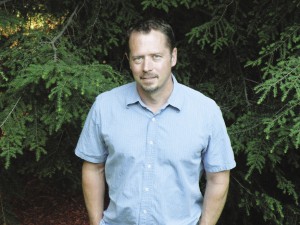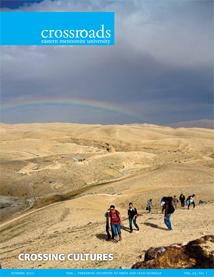
Photograph courtesy Lloyd Gingerich
Lloyd Gingerich ’90 had never stepped out of the United States before his cross-cultural trip to Central America in 1988. His experiences in Nicaragua, Costa Rica and Honduras greatly affected him and changed his faith as well as his life path after graduation.“In Nicaragua we got the opportunity to put the roof back on a rural schoolhouse that was hit by a hurricane the week before we arrived,” he recalls. “Traveling out to our remote location, our van was met by Sandinista soldiers at each bridge (guarding against Contra saboteurs) where we were questioned and allowed to pass. At night we slept in hammocks in the local church and heard occasional gunshots coming from the mountains.”
He continues:
In Honduras the faith and gratitude of Salvadoran refugees – who lived surrounded by barbed wire and heavily armed Honduran soldiers – challenged my own comfortable, easy faith. Once traveling through the country, our bus was stopped and we all sucked in our breath as a young soldier carrying an M16 walked down the aisle looking for anything suspicious.
In El Salvador we met the family members of murdered and mutilated victims of that county’s bloody civil war, listened to the stories of government opposition groups, and met with our own ambassador to El Salvador.
Guatemala was much more of a vacation for us as we climbed the Mayan ruins of Tikal and sunned on the shore of Lake Atitlan with its three volcanoes at the far end.
Gingerich says his EMU-sponsored travels motivated him to return to Costa Rica as a Mennonite Central Committee relief worker to rebuild earthquake-destroyed homes in a remote mountain region. He evolved into writing for an English-language magazine in Costa Rica and teaching in a bilingual school. He married a native of Costa Rica.
For much of the past 10 years, Gingerich has worked with migrant and bilingual children in schools in southwest Michigan. He is now the principal of an elementary school in Jenison, Michigan, where a Spanish immersion program just began. He hopes to enable children to become fluent in Spanish while gaining an appreciation of Latino cultures.
“There is so much more to gain when you take a risk than if you play it safe,” says Gingerich. “Taking risks in life is part of knowing life fully, and in the way God intends us to. Traveling and having a cross-cultural experience can change you and what you become, if you allow it to do that.”
—Rachael Keshishian
In the previous issue of Crossroads, we invited alumni to send us “vignettes” regarding their cross-cultural experiences. We picked Lloyd Gingerich’s (’91) story, above, as an example of the life-long impact that a cross-cultural experience might have on a student. Other interesting comments came from:
Dolores Martin ’82 // An English teacher and coordinator at Colegio Isaac Martin in Costa Rica, Martin is also the co-pastor, with her husband Martin Matamoros, of Comunidad Cristiana del Nuevo Pacto in Moravia, a Mennonite church in San Jose. Martin was a social work major. She writes: “I first came to Costa Rica in 1982 to do my social work practicum and credits of Spanish to graduate . . . If any EMUers plan to visit Costa Rica, we would love to hear from you!” (Her contact information is available through the EMU alumni office.)
Marie A. Kline ’86 // She did an independent cross-cultural study under the guidance of former faculty member Orv Gingrich. “My trip to Nigeria was life-career impacting. Since I was the mother of three young children I did not participate in the campus scene, but the modular program allowed me to forge through and meet my career goals. Thank you!” Kline is now a hospice nurse.
Joseph P. Shenk, class of ’87 (’89 grad) // On the spring 1985 Euroterm led by Ken J. Nafziger, “I developed my love for Europe, the baroque, cathedrals, organs, old art and architecture, castles, history, languages, the Alps, Johann Sebastian Bach, singing the music of Bach, the clean city of Munich with its wonderful transit systems, traveling, cultural traditions, opera and theater, public gardens and parks, Christian history, learning through experience, being a part of a group, and getting to know the locals.”
